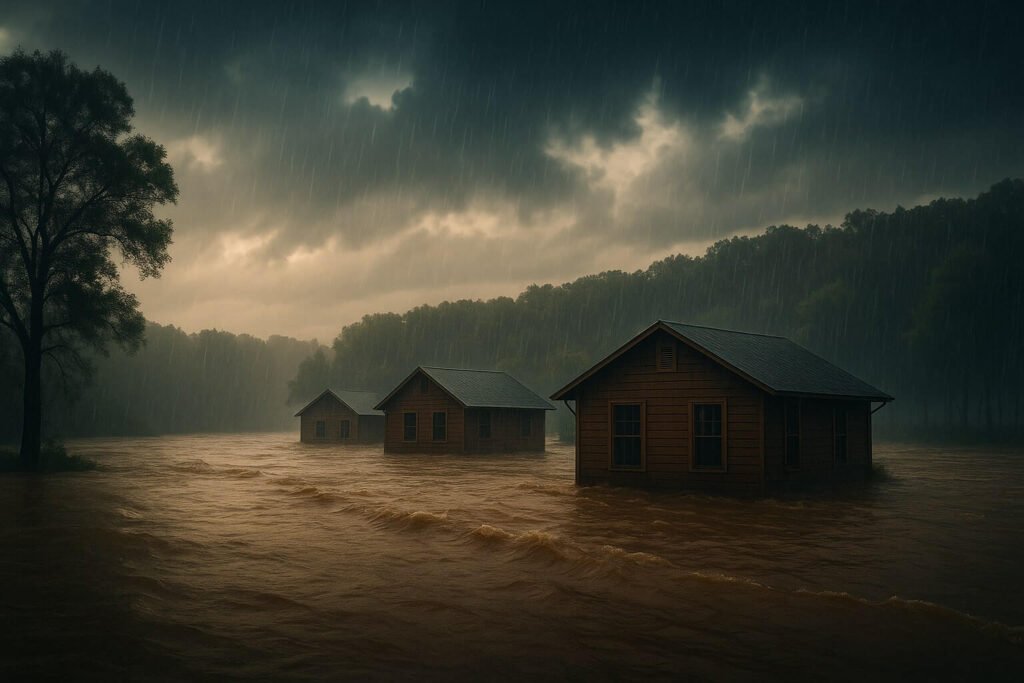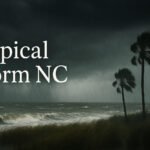The name Dick Eastland carries deep meaning across generations of Texas families, especially those who spent sun-soaked summers along the Guadalupe River at Camp Mystic. Now, in the wake of a devastating flash flood that tore through the Hill Country over the July 4th holiday, his name has taken on a new weight. This isn’t just a weather story. It’s a human story. A heartbreaking blend of meteorology, memory, and the kind of selfless leadership that reveals itself when every second counts.
When the river rose
In the early hours of July 4, 2025, thunderstorms began hammering the Hill Country. These weren’t typical summer storms. They were slow-moving, moisture-packed cells dumping rainfall at rates over three inches per hour. The terrain around Hunt and Kerrville, shaped by limestone cliffs and narrow valleys, channeled the deluge into a fury. By 5 a.m., the Guadalupe River had risen over 22 feet. That surge swept through dozens of low-water crossings, ranches, and yes, right through Camp Mystic.
Founded in 1926, Camp Mystic has been a sanctuary for young girls and a source of generational pride for Texas families. On that day, more than 700 campers and staff were on site. Among them was Dick Eastland, co-owner and camp director, a man whose voice was as steady as the current had now become wild. As floodwaters crept toward the campgrounds, he moved with one clear purpose: get the girls to safety.
He used a golf cart to shuttle campers to higher ground, then a small jon boat when the cart stalled. Witnesses say he was calm, reassuring. One of the last to leave the river cabins, Dick Eastland was still guiding campers when the boat capsized. His body was found downstream later that afternoon. He was 78.
A legacy shaped by service
Dick Eastland wasn’t just a camp director. He was a coach, a school board member, a cancer survivor, and the heart of Camp Mystic. His summer morning devotionals weren’t just tradition—they were woven into the fabric of the camp’s identity. He had a way of making everyone feel like they mattered. His famous line during fishing outings—“hold the fish closer, make it look big”—wasn’t just a joke. It was a lesson about perspective, confidence, and lightness in the midst of challenge.
Parents who sent their daughters to Mystic knew the camp’s magic came from him and his wife Tweety. Thousands of girls over five decades learned how to paddle a canoe, lead a cabin, or face fear with faith because of Dick Eastland’s quiet leadership. His loss is immeasurable.
The science behind the flood
So what caused the flooding that led to this tragedy? Several factors collided. A stalled trough over West Texas pulled in deep Gulf moisture. A low-level jet funneled that air into the Hill Country, where it met a weak front hovering over the Balcones Escarpment. These ingredients triggered repeated rounds of torrential rain over saturated soil.
Local rainfall totals reached 14 to 16 inches in some pockets. In Hunt, the Guadalupe rose more than 20 feet in just three hours. That’s the kind of rise typically associated with a hurricane’s landfall. The surrounding terrain, steep and rugged, gave the flood little room to spread out. Instead, it rushed toward the lowest points—river camps like Mystic being among them.
The National Weather Service had issued a flash flood warning, but in a landscape like this, even an hour’s head start might not be enough. By the time water reached the cabins, it was already too late for full evacuation.
Missing, mourning, and moving forward
As of this writing, at least 47 people have died across the affected region, with 27 Camp Mystic campers still unaccounted for. Helicopters, search dogs, and sonar-equipped boats continue to scour the Guadalupe for signs of life. Faith-based shelters in Kerrville and Ingram are housing families. Hospitals in Austin have admitted over 50 individuals for flood-related injuries.
The community response has been swift and heartbreaking. Prayer circles have formed on the Ingram bridge. Parents are waiting by cell phones that won’t stop ringing. Volunteers are baking casseroles for displaced families. Everywhere you look, Texans are doing what they can to make sense of a moment that feels senseless.
Governor Greg Abbott has declared a disaster across 26 counties. The Corps of Engineers has ramped up water releases from Canyon Lake. Barton Springs Pool in Austin is closed due to high bacteria. Road closures continue across Travis, Comal, Kerr, and Llano counties.
But through all of it, Dick Eastland remains the quiet thread holding the story together. A man who lived by faith and action, not title or ego. A man who stayed behind when he could have fled. A man who, by all accounts, died doing what he had done every summer of his life—looking after his girls.
Weather continues to threaten recovery
As rain continues to fall over already saturated ground, the threat isn’t over. Flash flood watches remain in effect for central Texas. The National Weather Service warns of another 2 to 4 inches over the next 48 hours. That could trigger new river rises and landslides, especially in hilly areas where roots are loosened.
Local officials are urging residents not to drive through water-covered roads. At least a dozen of the current fatalities have occurred inside vehicles. “Turn around, don’t drown” isn’t just a slogan right now—it’s a matter of survival.
The soul of Camp Mystic
What happened at Camp Mystic isn’t just a weather event. It’s a wound in the heart of Texas. For nearly 100 years, that camp has served as a haven for young women to grow in faith, strength, and friendship. It taught generations how to paddle, pray, sing, and lead. And for most of that time, Dick Eastland was the one setting the tone.
His death is more than a headline. It’s a gut punch to every family that ever waved goodbye to their daughter on drop-off day knowing she was in good hands. It’s a shockwave through a network of alumnae that stretches from the Texas Capitol to Wall Street. It’s a loss not just of a person, but of a way of leading—a kind, humble way that shaped lives.
Parents and former campers are already talking about how to honor his legacy. There’s word of a scholarship fund. Others want to install flood sensors on every riverfront cabin in the Hill Country. Some just want to sit with the grief a while before acting. That’s okay too.
Because grief, like a flood, follows no calendar. It arrives fast, carves deep, and recedes in its own time.
In the days ahead, we’ll learn more. We’ll hear stories of rescue and heartbreak, of girls holding hands in the dark, of staff who risked everything to protect others. We’ll see more rainfall and more warnings. We’ll argue about whether river camps should still exist in an era of rising flood risk.
But one thing won’t change: the legacy of Dick Eastland.
He was the heartbeat of Camp Mystic, the reason thousands of girls returned summer after summer. He gave his life to protect them. In a world that often celebrates the loudest, he showed us the power of quiet courage.
May his story live on, not only in memory but in the way we prepare, protect, and lead from here on.


